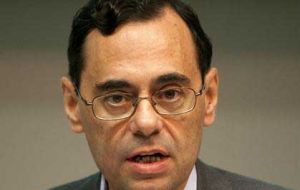MercoPress. South Atlantic News Agency
Global economy remains unbalanced after five years of financial strain, warns BIS
 BIS General Manager Jaime Caruana
BIS General Manager Jaime Caruana Those hoping for quick fixes to the strains in the global economy will continue to be disappointed, writes the Bank for International Settlements (BIS) in its 82nd Annual Report, released on Sunday.
Five years on from the outbreak of the financial crisis, and the global economy is still unbalanced, seemingly becoming more so as interacting weaknesses continue to amplify each other. The goals of balanced growth, balanced economic policies and a safe financial system still elude us.
The Report points out that the financial sector, governments, and households and firms need to repair their balance sheets: “the financial sector needs to recognize losses and recapitalize; governments must put fiscal trajectories on a sustainable path; and households and firms need to deleverage. As things stand, each sector's burdens ... are worsening the position of the other two.”
“The financial sector is putting pressure on the government,” the Report continues. “Governments, with their deteriorating creditworthiness and need for fiscal consolidation, are hurting the ability of the other sectors to right themselves. And as households and firms work to reduce their debt levels, they hamper the recovery of governments and banks. All of these linkages are creating a variety of vicious cycles.”
“Central banks,” the Report says, “find themselves in the middle of all of this, pushed to use what power they have to contain the damage: pushed to directly fund the financial sector and pushed to maintain extraordinarily low interest rates to ease the strains on fiscal authorities, households and firms. This intense pressure puts at risk the central banks' price stability objective, their credibility and, ultimately, their independence.”
Breaking the vicious cycles and thereby reducing the pressure on central banks, the BIS says, is critical. It can be accomplished by “cleaning up and strengthening banks at the same time as the size and riskiness of the financial sector are brought under control. ... Only then, when balance sheets across all sectors are repaired, can we hope to move back to a balanced growth path. Only then will virtuous cycles replace the vicious ones now gripping the global economy.”
Christian Noyer, BIS Chairman and Governor of the Bank of France, said: “We have yet to achieve the goal of a strong and stable financial environment for the global economy. To get there, the international community must intensify its cooperative efforts to reduce global financial imbalances and improve international financial regulation.”
BIS General Manager Jaime Caruana told central bankers gathered for the Bank's Annual General Meeting in Basel: “The current difficulties of the world economy have deep roots and will require fundamental solutions. Fiscal adjustment, the repair of banks' balance sheets and other reforms cannot be put off in the hope of better times. Relying only on central banks but failing to act on other fronts would ultimately damage confidence and increase the risks to macroeconomic and financial stability.”
The BIS's financial results, which were also published in the Annual Report, included a balance sheet total of SDR 255.7 billion (395.9 billion dollars) at end-March 2012 and a net profit of SDR 758.9 million ( 1,174.9 million dollars).




Top Comments
Disclaimer & comment rulesCommenting for this story is now closed.
If you have a Facebook account, become a fan and comment on our Facebook Page!